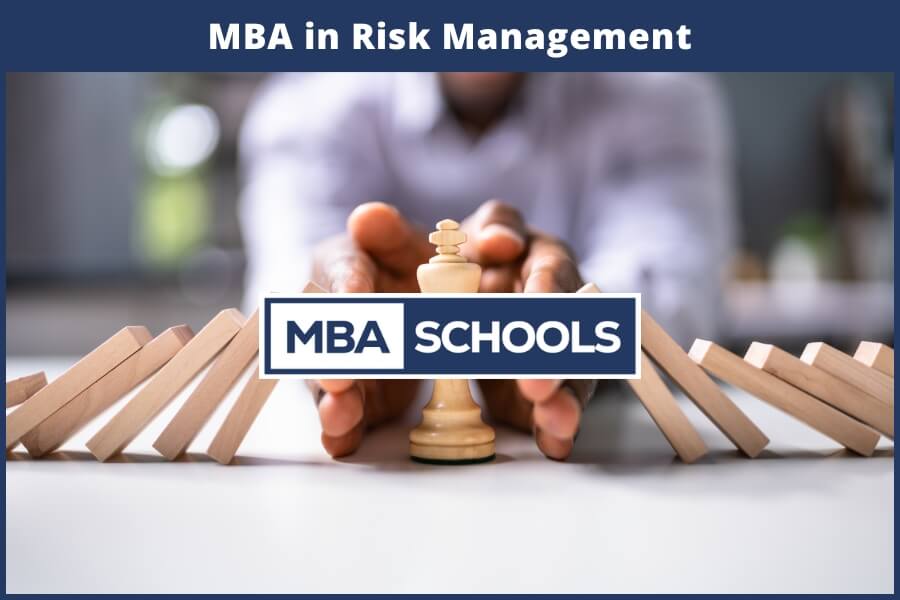MBA in Risk Management
An MBA in Risk Management is designed for professionals looking to identify, analyze, and mitigate financial, operational, and strategic risks within organizations. This specialization focuses on corporate risk assessment, insurance management, financial risk modeling, and regulatory compliance, equipping graduates with the expertise to manage uncertainty, enhance business resilience, and develop risk-mitigation strategies.
According to Deloitte, risk management professionals with an MBA earn up to 30% more than those without advanced degrees, highlighting the value of specialized education in this field ( Deloitte). Additionally, the U.S. Bureau of Labor Statistics (BLS) projects that risk management and financial analysis jobs will grow by 17% through 2030, outpacing many other business fields ( BLS).
An MBA in Risk Management specialization is ideal for professionals seeking to develop strategies to minimize financial loss, ensure regulatory compliance, and manage corporate risk across industries.

Table of Contents
What is an Online MBA in Risk Management?
An Online MBA in Risk Management provides a flexible pathway for professionals looking to develop expertise in enterprise risk management, regulatory frameworks, and strategic risk assessment while continuing their careers. These programs focus on fraud detection, financial risk mitigation, and crisis management, helping students prepare for leadership roles in corporate finance, insurance, cybersecurity, and compliance.
Students gain expertise in quantitative risk modeling, credit risk analysis, and operational risk assessment, ensuring they are equipped to identify vulnerabilities and develop proactive strategies to protect businesses. Many online programs include real-world case studies, enterprise risk simulations, and corporate governance projects, providing an immersive learning experience.
What Are the Admissions Requirements for an MBA in Risk Management?
Admissions requirements for an MBA in Risk Management vary by program, but typically include:
- Bachelor’s Degree – From an accredited institution, often in business, finance, economics, or a related field.
- Work Experience – 2-5 years of professional experience in finance, risk analysis, insurance, or business management is preferred.
- GMAT/GRE Scores – Some programs require standardized test scores, while others offer waivers.
- Personal Statement – Discussing career goals and why the applicant is pursuing an MBA in Risk Management.
- Letters of Recommendation – Typically from employers, risk management executives, or academic mentors.
- Resume – Highlighting experience in risk assessment, compliance, or corporate governance.
Is an MBA in Risk Management the Right Specialization for You?
An MBA in Risk Management specialization is best suited for professionals who are detail-oriented, analytical, and proactive in managing corporate and financial risks. If you are interested in financial stability, risk mitigation, and compliance regulations, this specialization will provide the necessary skills for career advancement.
Compared to other MBA specializations, such as Finance or Corporate Governance, an MBA in Risk Management focuses on enterprise-wide risk control, insurance strategies, and crisis response planning. If you want to lead risk analysis for multinational corporations, oversee regulatory compliance, or manage cybersecurity threats, this program may be the best fit for you.
MBA in Risk Management Curriculum: What Classes Will I Take?
Most MBA in Risk Management programs take 1-2 years to complete, depending on whether students enroll full-time, part-time, or in an accelerated format.
Core Courses in an MBA in Risk Management
The curriculum for a Risk Management MBA specialization blends business strategy with risk mitigation expertise through courses such as:
- Enterprise Risk Management & Corporate Strategy
- Financial Risk Analysis & Quantitative Modeling
- Insurance & Risk Transfer Strategies
- Regulatory Compliance & Legal Risk Frameworks
- Fraud Detection & Cybersecurity Risk Management
- Crisis Management & Business Continuity Planning
- Credit Risk & Investment Risk Strategies
- Operational Risk & Supply Chain Management
Many programs also incorporate risk management consulting projects, including real-world case studies in corporate fraud prevention, financial risk control, and disaster recovery planning. Some students complete internships with insurance firms, financial institutions, or corporate compliance departments to gain hands-on experience before graduation.
What Career Options Do I Have with an MBA in Risk Management?
An MBA in Risk Management specialization prepares graduates for leadership roles in corporate finance, insurance, compliance, and cybersecurity. Common job titles include:
- Risk Manager – Oversees enterprise risk assessment and mitigation strategies.
- Chief Risk Officer (CRO) – Leads risk management policies and regulatory compliance for corporations.
- Financial Risk Analyst – Assesses credit, investment, and market risks for financial institutions.
- Corporate Compliance Officer – Ensures adherence to industry regulations and legal frameworks.
- Insurance & Claims Manager – Develops and manages insurance policies and business claims.
Salary Expectations
Salaries for MBA in Risk Management graduates vary based on industry, experience, and expertise. According to Deloitte and BLS, risk professionals with an MBA typically earn:
- Risk Manager – $110,000 – $180,000
- Chief Risk Officer (CRO) – $150,000 – $350,000
- Financial Risk Analyst – $100,000 – $190,000
- Corporate Compliance Officer – $115,000 – $220,000
- Insurance & Claims Manager – $105,000 – $200,000
Take the Next Step Toward a Leadership Role in Risk Management
An MBA in Risk Management provides the expertise needed to assess financial and operational risks, ensure regulatory compliance, and develop enterprise-wide risk strategies. Whether you want to manage corporate risks, oversee financial security, or lead compliance initiatives, this degree will give you the knowledge, skills, and network to achieve your career goals.
Explore top-ranked MBA in Risk Management programs today and start advancing your career.
Sources
- Deloitte. (2023). Risk Management & Corporate Compliance Trends. Retrieved from https://www2.deloitte.com/
- U.S. Bureau of Labor Statistics. (2023). Occupational Outlook Handbook: Risk Management Careers. Retrieved from https://www.bls.gov/